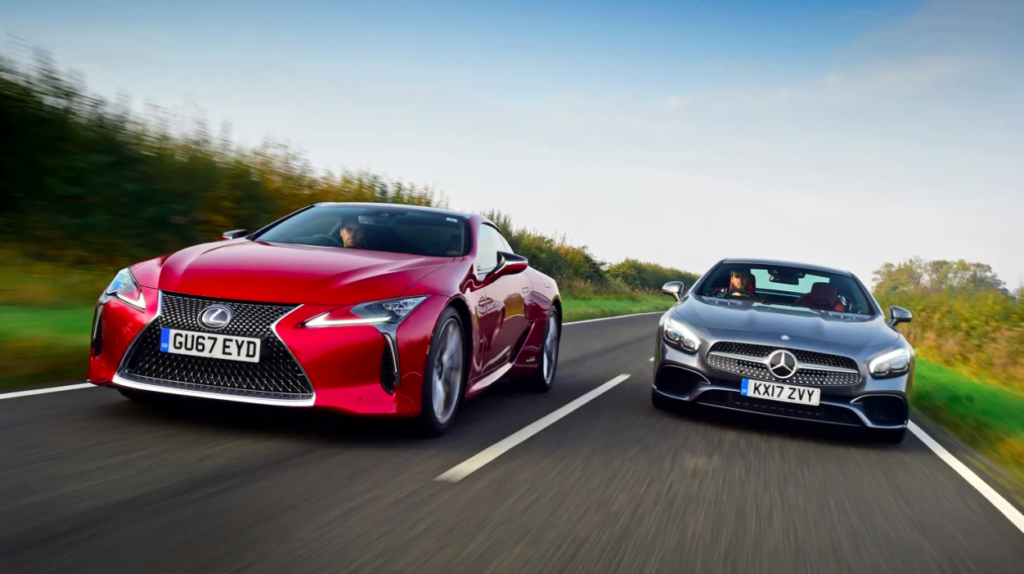

Is Lexus Better Than Mercedes? A Head-to-Head Showdown
When it comes luxury automobiles, two prominent contenders stand out—Lexus and Mercedes-Benz. Each brand boasts a rich history, with Mercedes-Benz synonymous with German engineering excellence and Lexus hailed for its Japanese precision and luxury. But when it comes to choosing between them, the question remains: “Which one reigns supreme?” Let’s delve into their key aspects and uncover the champion.
History and Niche:
Lexus, born in 1989, aimed to redefine luxury with Japanese precision and reliability. Mercedes, with a storied legacy dating back to 1886, embodies German engineering and performance pedigree. Lexus carved a niche in comfort and refinement, while Mercedes emphasizes performance and driver engagement.
Perfomance:
Mercedes-Benz has a longstanding reputation for delivering powerful and performance-oriented vehicles. With options ranging from the spirited C-Class to the high-performance AMG lineup, Mercedes impresses with its acceleration, handling, and overall driving dynamics. Lexus, on the other hand, has made strides in performance, particularly with models like the Lexus LC 500, showcasing a V8 engine and engaging driving experience. However, Mercedes’ extensive AMG lineup and its Formula 1 heritage give it the edge in raw performance. Take the S-Class AMG vs. the LS F Sport: 0-60 mph in 3.2 seconds for the Mercedes, 4.5 seconds for the Lexus. However, Lexus counters with superior handling and ride quality, offering a more comfortable and composed driving experience. Verdict: Horsepower to Mercedes, driving balance to Lexus.
Interior:
Both brands excel in crafting luxurious interiors, but the balance tips in favor of Mercedes-Benz. The German automaker has consistently set the benchmark for premium interiors, featuring top-notch materials, meticulous craftsmanship, and innovative design. Lexus, known for its attention to detail and quality, offers a comfortable and refined cabin but doesn’t quite match the opulence found in Mercedes-Benz vehicles.
Drive Feel and Quality:
Mercedes-Benz epitomizes a smooth and comfortable ride, with advanced suspension systems providing unparalleled comfort. Mercedes delivers a dynamic and engaging driving experience with tight steering, responsive engines, and a focus on feedback. Lexus, while offering a comfortable ride, tends to lean slightly towards a sportier feel. Mercedes-Benz’s overall drive quality and refined handling give it an edge in this category.
Safety Features:
Both Lexus and Mercedes-Benz prioritize safety, equipping their vehicles with advanced safety technologies. Features such as collision avoidance, adaptive cruise control, and lane-keeping assist are prevalent in both brands. The 2024 Lexus NX and Mercedes GLE both earned Top Safety Pick+ awards from the IIHS, with advanced driver-assistance features like automatic emergency braking and lane departure warning becoming standard. Verdict: Tie – safety reigns supreme for both.
Technology and Innovation:
Mercedes leads the charge with pioneering autonomous driving technology and in-car AI assistants like MBUX. Lexus focuses on hybrid and electric technology, offering superior fuel efficiency and environmental consciousness. Mercedes-Benz leads in technological innovation, boasting the impressive MBUX infotainment system, augmented reality navigation, and advanced driver assistance features. Lexus, while incorporating cutting-edge tech, doesn’t quite match the comprehensive technology suite found in Mercedes-Benz vehicles.
Fuel Consumption:
Lexus shines in fuel efficiency, especially with its hybrid offerings. The Lexus RXh achieves 34mpg combined, while the Mercedes GLE struggles at 19mpg. For eco-conscious driving, Lexus takes the crown. Mercedes-Benz, while making strides in fuel-efficient models, generally falls behind Lexus in this aspect.

Running and Maintenance Cost:
Lexus has earned a reputation for reliability and lower maintenance costs compared to German luxury counterparts. Mercedes-Benz, while offering exceptional performance, may incur higher maintenance costs over the long term. Mercedes repairs and maintenance tend to be pricier due to the complexity of their technology, so Lexus’s reputation for reliability can translate to lower costs in the long run.
Styling:
Styling preferences are subjective, but both brands have distinct design languages. Mercedes-Benz embodies sophistication and timeless elegance, while Lexus often leans towards bold and avant-garde designs. The verdict on styling depends on personal taste, with both brands appealing to different aesthetics. Verdict: Subjective – beauty in the eye of the beholder.
General Prices:
Mercedes-Benz typically commands a higher price point than Lexus across various models. The higher cost is justified by the German brand’s premium features, advanced technologies, and overall performance, For example, the starting price of the S-Class is significantly higher than the LS.
Conclusion:
In the grand debate of Lexus versus Mercedes-Benz, the verdict is nuanced. Mercedes-Benz emerges as the pinnacle of performance, interior opulence, and cutting-edge technology, but this comes at a premium. Lexus, with its reliability, fuel efficiency, and lower maintenance costs, provides a compelling alternative. The choice ultimately rests on individual priorities, whether it be the thrill of the drive, the allure of luxury, or the pragmatic considerations of ownership costs.
Add a comment Cancel reply
Categories
- Car Gadgets (17)
- Car News (33)
- Car Reviews (43)
- Car Wars (7)
- Mechanicals (32)
- Uncategorized (2)
Recent Posts
About us

Popular Tags
Related posts


Which one is Better , BMW X5 2020 or Audi Q7 2020

Isuzu D-Max vs Toyota Hilux: 2020 Double Cab Showdown








